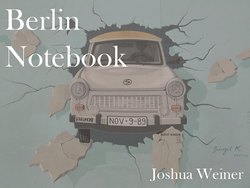Читать книгу Berlin Notebook - Joshua Weiner - Страница 16
На сайте Литреса книга снята с продажи.
ОглавлениеTHE INSIDER OUTSIDE AND THE OUTSIDER INSIDE
Sunday, October 11, 2015
Pedaling through the Tiergarten on a bright Sunday in October, you would expect to see plenty of others enjoying the day; but today the park is teeming with thousands of stragglers still in town after yesterday’s massive demonstration against the US-EU trade pact (TTIP/CETA). Hundreds of thousands came out, by the literal busload. The speeches and music floated up several kilometers and over the roofs of the Naturkundemuseum and the new CIA building to tickle my ear through the open window.
I’ve stayed inside, working on these journal entries, studying some German, and losing myself in Joseph Roth’s Weimar-era writing about the city (collected under the title, What I Saw: Reports from Berlin 1920-1933, translated by Michael Hofmann). Though these dispatches originally appeared in newspapers, they transcend their immediate genre. As flâneur, Roth was not only observant, sympathetic, ironical, and intrepid, paying close attention to the lives of struggling immigrants, displaced Jews, and homeless in the mechanical metropolis with its seedy glamour—his vision is penetrating, his comprehension indelible. “Phenomena and atmospheres and experiences differ,” he writes, “not in their essence, but in secondary qualities like scale.” Everywhere in these reports from the streets of Berlin, Roth shifts the scale so that we can see what otherwise we’d walk right by, “to learn that a slightly bent hand can hold in it the misery of all time.” The novelist is always awake in these sentences. Roth was paid for each one, but a personal relish for the startling detail and comprehensive sweep animates every phrase.
But one cannot always be observing firsthand; one must also stay inside and reimagine, sift, refine, and sharpen sentences. Such was Saturday. And with such a massive demonstration, I would get lost in the scripted sentiments, the replicated postures. But you couldn’t escape the gist: “STOP TTIP/CETA für einen gerechten Welthandel”(“STOP TTIP/CETA for a world of fair trade”). Today, red and green flags still wander the Tiergarten, the demo anti-corporate/pro-environment/pro-labor/pro-consumer/pro-democracy vibe sustaining a feeling of positive lift.
I pedal through the aimless political drift, zigzagging my way to the Chinese poet Yang Lian (or, as one would say in English, Lian Yang) in Schöneberg, my old Kiez from two years ago. The hookers of Kurfürstenstrasse are already out on a Sunday afternoon, a block or so from Lian’s conspicuously renovated stretch—such is Berlin, where prostitution is legal. They all look like immigrants from the East, some having perfected their slow sexual strutting, others merely standing in the street as if they are saving a parking space for a friend. Bright high-cut shorts hug flesh-tone tights—it’s getting colder—and make theatrically explicit the parody of flashy mating dance. Maybe women hooking from Poland, Hungary, Czech Republic, Serbia, Macedonia have the relative privilege of working in the brothels ... am I seeing a societal labor sub-class? Note to self: ask a German guy in a Kneipe near Oranienstrasse (another street, in Mitte, where I’m living now, also known as a district for sex workers—they hover around the historic Neue Synogogue).
